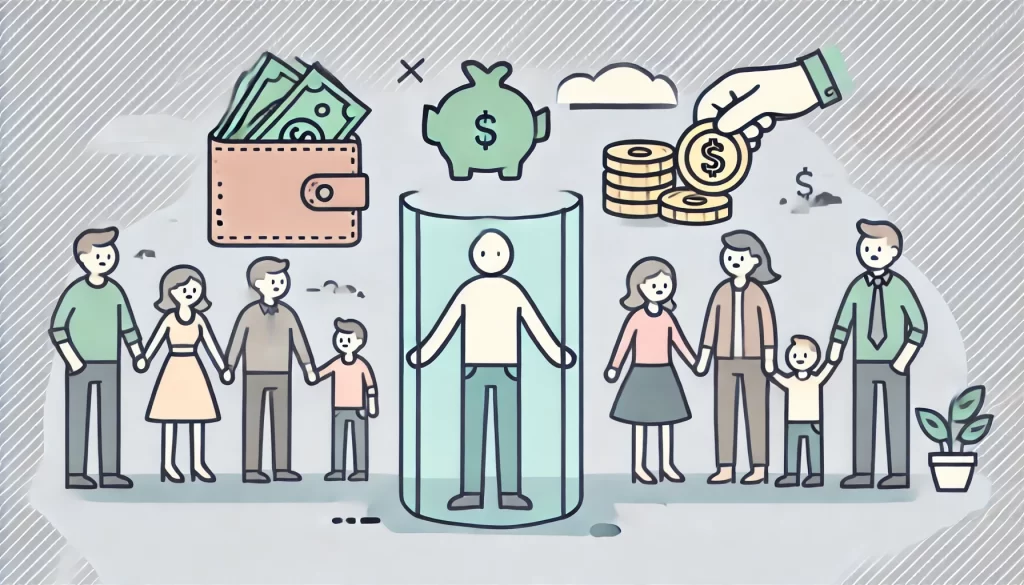I remember when my best friend asked for $5,000 for a business idea. My heart was racing, unsure if I should help or protect my money. This moment started my journey in setting financial boundaries.
Setting financial boundaries isn’t just about saying no to loans. It’s about keeping your money safe while still being close to others. It’s a mix of managing your money and being smart about feelings.
Learning about money isn’t just about saving. It’s also about telling your closest friends and family about your money limits. This has shown me the good side of setting money rules. It reduces stress and makes friendships stronger.
Key Takeaways
- Setting financial boundaries helps prevent money-related strain in relationships
- Clear financial rules make decision-making easier when faced with money requests
- It’s okay to say “no” to lending money you can’t afford to lose
- Boundaries protect against feelings of being financially exploited
- Open communication is crucial when establishing financial limits
- Setting boundaries can lead to healthier, more respectful relationships
Understanding the Importance of Financial Self-Protection
Financial self-protection is key for reaching financial goals and keeping wealth safe. It means setting clear limits and staying away from bad money habits. These habits can mess up our financial plans.
Defining Personal Financial Goals First
I always start by setting my personal financial goals. This could be saving for a house or paying off debt. Having clear goals helps me protect my money from outside pressures.
Recognizing Signs of Financial Pressure
It’s vital to notice when friends and family put financial pressure on us. This might be when they ask for money a lot or expect us to help financially. Spotting these signs early helps me keep my finances healthy.
The Impact of Unset Boundaries on Wealth Building
Not having boundaries can hurt our wealth building. It can take away from our financial goals and cause ongoing money problems. To prevent this, I follow these tips:
- Communicate my financial goals clearly
- Set limits on lending money
- Offer non-monetary support when possible
- Be prepared for potential pushback
Using these strategies helps me keep my finances safe while still keeping good relationships. Remember, setting financial boundaries isn’t selfish. It’s a necessary step for long-term financial success.
Setting Financial Boundaries with Friends and Family
Setting financial boundaries is key for healthy relationships and stable money. Indeed, 55% of people say clear money rules are vital for keeping finances stable. Yet, 45% of us find it hard to say no to money asks from family and friends.
To follow good money lending rules, I’ve found some smart ways to avoid debt. I share my money goals early and clearly. This sets clear expectations and avoids awkward moments later. I also offer other ways to help when asked for money, which keeps my boundaries while showing support.
| Aspect | Percentage |
|---|---|
| Struggle with setting financial boundaries | 68% |
| Prioritize own financial needs | 70% |
| Believe communication is key | 82% |
| Think saying no can benefit others’ habits | 60% |
Remember, setting boundaries takes time to get used to. But staying firm is crucial. By keeping these limits, I manage my money better and still support my loved ones in good ways.
Creating a Strategic Approach to Money Requests
Having a plan for money requests is crucial for good financial health. It helps keep your money safe while keeping relationships strong. By saying no to loans and talking openly about money, you can do both.
Developing Pre-planned Responses
It’s smart to think ahead for money requests. This way, you’re ready and can answer wisely. For instance, you might say, “Thanks for thinking of me, but I can’t lend money now.”
Having these answers ready helps you stick to your financial choices.
Setting Clear Monetary Limits
It’s important to know how much you can lend or give. I’ve decided on a certain amount based on my budget and goals. This keeps me from spending too much and helps me stay on track financially.
Establishing Communication Guidelines
Talking openly about money is key. I’ve told my friends and family about my money limits. This way, we avoid misunderstandings and feelings of resentment. It sets a clear path for talking about money respectfully.
Using these strategies makes handling money requests easier. It’s about being supportive and keeping your finances safe at the same time.
Managing Emotional Aspects of Financial Boundaries
Setting financial boundaries is key for emotional finance and healthy relationships. It’s not just about money. It’s also about handling feelings and what we expect from others.
Dealing with Guilt and Pressure
I often felt guilty saying no to money requests from loved ones. It’s normal to feel frustrated, guilty, and angry when asked for money again and again. I tell myself that setting boundaries is caring for myself and is vital for my financial health.
Handling Family Expectations
Family expectations can be tough. Talking openly about money helps set clear limits. It’s crucial to know the difference between hard (non-negotiable) and soft (flexible) boundaries in family finances.
Maintaining Relationships While Saying No
Saying no doesn’t mean you don’t care. I’ve learned to offer other ways to help or suggest other resources. This way, I keep my financial health safe while still caring for my relationships. Remember, it’s okay to put your financial goals first.
| Boundary Type | Description | Example |
|---|---|---|
| Physical | Personal space and touch | Not lending credit cards |
| Emotional | Feelings and energy | Not taking on others’ financial stress |
| Material | Money and possessions | Setting lending limits |
| Time | How you spend your time | Limiting financial advice sessions |
By managing these emotional aspects, I’ve found a balance. This balance is between being financially responsible and keeping strong relationships. It’s a journey, but it leads to better finances and more meaningful connections with loved ones.
Implementing Practical Money Lending Guidelines
Setting financial boundaries with family can be tricky. I’ve learned that clear money lending guidelines are crucial. They protect both my finances and relationships. Let’s dive into some practical steps I’ve found helpful.
First, I set a maximum amount I’m willing to lend. This helps me avoid overextending myself. For larger loans, I always use written agreements. They spell out repayment terms and interest rates. This clarity prevents misunderstandings down the road.
Before lending, I consider the impact on my relationship. Sometimes, saying no is the best choice. I’ve learned to prioritize my own financial stability. This might seem selfish, but it’s necessary for long-term financial health.
| Guideline | Purpose | Benefit |
|---|---|---|
| Set maximum lending amount | Avoid overextension | Protects personal finances |
| Use written agreements | Clarify terms | Prevents misunderstandings |
| Consider relationship impact | Protect relationships | Maintains family harmony |
| Prioritize personal stability | Ensure financial health | Secures long-term financial future |
Remember, it’s okay to say no. A 2022 survey found that 42% of people lost money lending to friends or family. By implementing these guidelines, I’ve improved my financial security and maintained healthier relationships.
Building Supportive Financial Relationships
Creating a network of money-conscious friends is key for keeping financial boundaries. It’s not just about finding people who share your money goals. It’s about being around those who respect your choices. In my journey towards financial literacy, I’ve found the strength of supportive groups.
Finding Like-minded Money-conscious Peers
Connecting with others who value money responsibility has changed my life. Studies show setting financial boundaries makes us feel more powerful. Sharing my financial goals with friends has stopped misunderstandings and made our bonds stronger.
Creating Alternative Ways to Show Support
Support doesn’t always mean giving money. Offering my time or skills is a meaningful way to help friends without spending my money. This method has kept me from feeling used or resentful, which can happen when money boundaries are crossed.
Developing Healthy Financial Discussions
Talking openly about money with friends has made our connections deeper. I’ve learned to respect privacy and boundaries in these talks. By being non-judgmental and using proactive communication, I’ve added empathy and understanding to our friendships. This has not only made our relationships stronger but also helped me financially.






